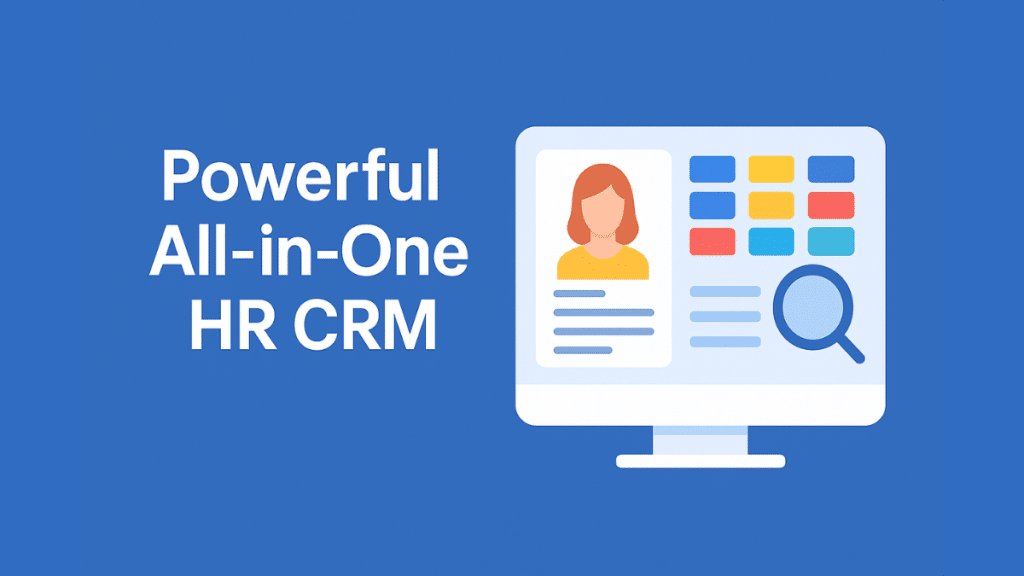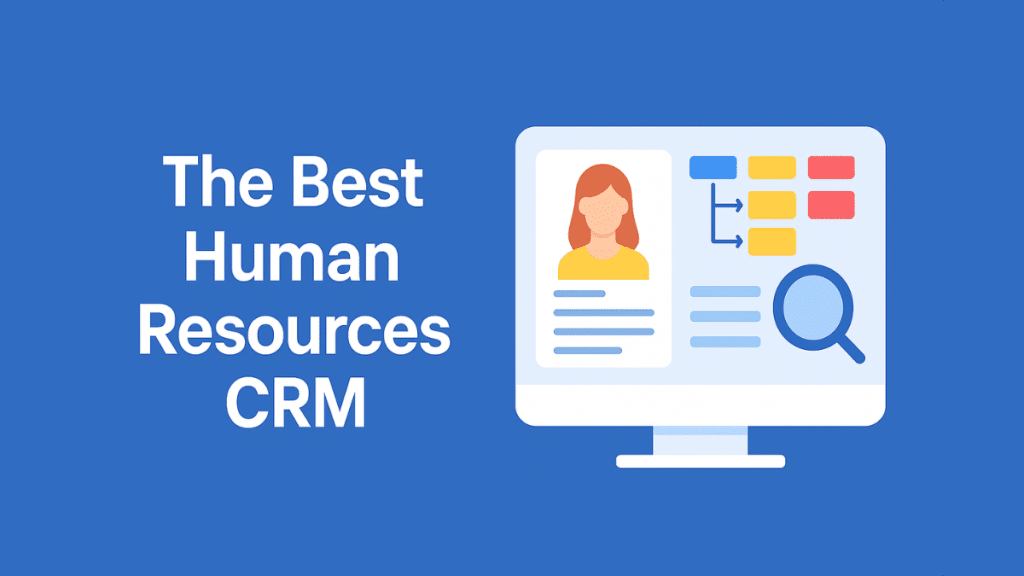Businesses need more than just intuition to manage their workforce effectively. They need data-driven, automated systems that empower HR professionals to focus on strategic goals instead of manual tasks. Enter the world of human resources CRM – a transformative technology designed to centralize, automate, and personalize every aspect of human capital management. From hiring and onboarding to retention and performance management, an HR CRM can be a game-changer for companies of all sizes.
What Is Human Resources CRM?
A Human Resources CRM (Customer Relationship Management) system is a specialized platform adapted for managing relationships not with external clients, but with internal customers – your employees and candidates. While CRMs have traditionally been sales-focused, HR CRMs are tailored to track, engage, and nurture talent throughout the employee lifecycle.
Unlike standard HR software or payroll tools, HR CRMs go a step further by enabling communication automation, personalized engagement strategies, candidate pipelines, employee journey mapping, and performance tracking. They act as a central hub for all data related to your workforce and future hires.
In short, a CRM of human resources brings sales-like rigor and customer-centric thinking into the realm of HR, creating a more responsive, strategic, and people-first department.
What’s the Purpose of a CRM System in Human Resources?
The purpose of using a CRM system in HR is rooted in the shift from administrative management to employee experience and strategic workforce planning. Here’s how an HR CRM makes that possible:
1. Enhanced Talent Acquisition
HR CRMs allow you to manage the entire recruitment funnel – from sourcing and outreach to interviewing and onboarding. You can segment candidates, nurture talent pools, track engagement, and send automated follow-ups. This reduces time-to-hire and ensures a higher quality of talent.
2. Personalized Candidate and Employee Experience
Just like marketing CRMs track customer preferences, HR CRMs monitor employee engagement levels, feedback, learning progress, and other touchpoints. This enables more tailored interventions, whether it’s personalized learning paths or well-timed check-ins during onboarding.
3. Data-Driven Decision Making
An HR CRM collects valuable insights that help HR leaders make informed decisions about promotions, role changes, and workforce planning. It also helps predict churn and identify productivity bottlenecks using behavioral data.
4. Process Automation
From candidate outreach to scheduling interviews and onboarding workflows, HR CRMs reduce repetitive administrative tasks. This frees up time for HR teams to focus on culture, strategy, and employee engagement.
5. Integration Across Departments
HR CRMs integrate seamlessly with performance management tools, payroll systems, learning management systems, and communication platforms, ensuring a unified view of each employee.
Top 8 HR CRM Solutions (2025)
If you’re looking to adopt an HR CRM, here are eight of the top platforms in 2025, each offering unique strengths:
1. Bitrix24
Bitrix24 is a powerful all-in-one platform that includes CRM features tailored for HR teams. It enables comprehensive HR management including recruitment pipelines, onboarding automation, internal communication, and document management. Its human resources CRM capabilities allow you to build structured workflows, monitor employee interactions, and automate feedback collection. Integrated calendars, task tracking, and collaboration tools make Bitrix24 especially strong for remote and hybrid teams.
Pros:
● All-in-one HR and business management system
● Automated HR workflows and reminders
● Excellent integration with communication tools
Cons:
● Can be complex for small teams without initial training

2. Zoho Recruit
A specialized solution within the Zoho ecosystem, Zoho Recruit offers powerful CRM-style features for recruitment. It allows HR teams to source, assess, and onboard candidates, complete with automation and AI-driven suggestions.
Pros:
● Great for staffing agencies and recruiters
● AI-based candidate ranking
● Easy integration with other Zoho apps
Cons:
● More focused on external hiring than internal HR needs
3. Freshteam by Freshworks
Freshteam is an intuitive and user-friendly HR CRM designed for growing companies. It supports applicant tracking, employee database management, and time-off tracking.
Pros:
● Clean UI
● Great onboarding workflows
● Mobile-friendly
Cons:
● Limited reporting features in the free plan
4. Monday.com HR CRM
Though better known as a project management tool, Monday.com offers customizable templates to manage HR pipelines, hiring, and employee experience. It’s ideal for organizations looking for flexibility and visual workflow tracking.
Pros:
● Highly customizable
● Visual dashboards
● Integration with existing tools
Cons:
● Not HR-specific; requires manual setup
5. BambooHR
BambooHR blends traditional HRIS with CRM-like candidate and employee journey tracking. It offers tools for performance reviews, onboarding, and e-signatures, and is tailored for small to midsize businesses.
Pros:
● Excellent UX for non-technical users
● Great employee self-service features
● Well-structured HR workflows
Cons:
● Limited customization for larger enterprises
6. Workable
Workable combines applicant tracking with collaborative hiring workflows. It shines in sourcing and nurturing passive candidates, offering email automation and candidate evaluation tools.
Pros:
● Great recruitment pipeline visualization
● AI-powered sourcing tools
● Team collaboration features
Cons:
● Less focus on post-hire employee management
7. Salesforce for HR
Salesforce can be tailored into a human resources CRM with its powerful customization capabilities. HR teams can use it for onboarding workflows, internal mobility tracking, and employee feedback automation.
Pros:
● Best-in-class CRM core
● Endless customization
● Enterprise-grade analytics
Cons:
● High cost and complexity for small HR teams
8. HubSpot CRM (Custom HR Version)
While HubSpot isn’t designed specifically for HR, many teams customize it using workflows and pipelines to manage recruiting and engagement. Its strength lies in outreach automation and content management.
Pros:
● Free core CRM
● Excellent email and communication tools
● Easy-to-use interface
Cons:
● Requires setup to fit HR use cases
Effective HR with CRM System
Implementing a CRM system in HR isn’t just about streamlining processes – it’s about rethinking how we engage with talent. Here’s how to ensure a successful HR CRM implementation:
1. Align HR Goals with CRM Capabilities
Before selecting a platform, define your core objectives. Are you looking to speed up recruitment? Improve onboarding? Increase engagement? Choose a CRM that aligns with these goals.
2. Involve Stakeholders Early
Engage HR managers, recruiters, and even IT in the decision-making process. This ensures that your chosen system integrates well with existing workflows and receives proper adoption.
3. Customize Your Pipelines
Don’t settle for generic pipelines. Customize stages for recruitment, onboarding, performance reviews, and employee feedback loops based on your organization’s structure.
4. Automate, But Don’t Dehumanize
Use automation to handle repetitive tasks like email follow-ups or calendar invites, but always retain a human touch for interviews, feedback sessions, and recognition.
5. Train Your Team
Even the best HR CRM can underperform if your team doesn’t know how to use it. Invest in training to ensure your HR team is confident using the platform to its full potential.
6. Measure Success
Track KPIs such as time-to-hire, candidate engagement rate, employee retention, and HR task completion time. A good HR CRM will offer these insights in easy-to-read dashboards.
Conclusion
As HR evolves from administrative support to strategic leadership, tools like human resources CRM platforms are becoming essential. They not only simplify daily operations but also empower HR professionals to create better experiences for candidates and employees alike.
Whether you’re a startup looking to scale your recruitment or an enterprise seeking to enhance employee engagement, adopting a CRM for HR will put you ahead of the curve. Among the top solutions, Bitrix24 stands out as an all-in-one platform that balances automation, communication, and personalization – making it a worthy investment for forward-thinking HR teams.
With the right HR CRM in place, your team can shift focus from managing paperwork to building a culture of growth, transparency, and engagement.
